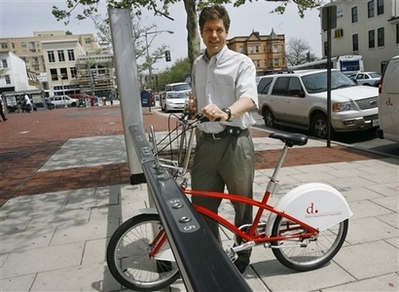Institutional memberships in DC bicycle sharing programs

Jim Sebastian, with the District of Columbia's Department of Transportation, poses with a SmartBike DC prototype bicycle in Washington on Thursday April 24, 2008. The system allows annual members to pick up and drop off bicycles in the city, and is the first such program to launch in the United States. The European-style bike-sharing service is similar to car-sharing services like Zipcar. (AP Photo/Jacquelyn Martin)
One of the things a group of us is suggesting, is that differential memberships be created so that institutions can join the SmartBikeDC bicycle sharing program, and offer participation at a group rate, potentially discounted.
For example, this New York Times article on the program, "Bicycle-Sharing Program to Be First of Kind in U.S.," says:
At George Washington University in Foggy Bottom, one of the program’s 10 locations, students were unsure how often they would use SmartBike, but said its price made it worth a try. “I’d probably use it more in the summer than winter,” said Dewey Archer, a senior. “But for $40? That’s cheaper than gas.”
But what if every GWU student had membership privileges to SmartBikeDC through a smart card chip in their student id?
Or rather than the U.S. House of Representatives launch their own bike fleet for employee use during the day, pay into the SmartBikeDC system by adding some stations and bicycle inventory, and allowing Congressional staffers to participate in the entire system, not just a small little fleet on the Capitol Campus. (See "The Bike-sharing Blog: Wheels4Wellness in the House.")
Same thing with people who work for the DC Government.
I was glad to see that the DC Government has a green initiative, but saddened to see the focus on automobiles was so limited -- getting hybrids -- rather than to encourage the use of alternatives to vehicles whenever possible (one less car is one less vehicle that has to be purchased, managed, maintained, depreciated, and replaced, allowing DC funds to be spent on other things).
Etc.
Labels: bicycling, environment, transportation demand management, transportation planning, urban design/placemaking



0 Comments:
Post a Comment
<< Home